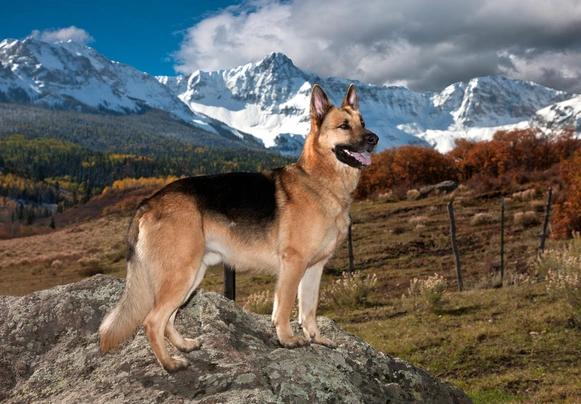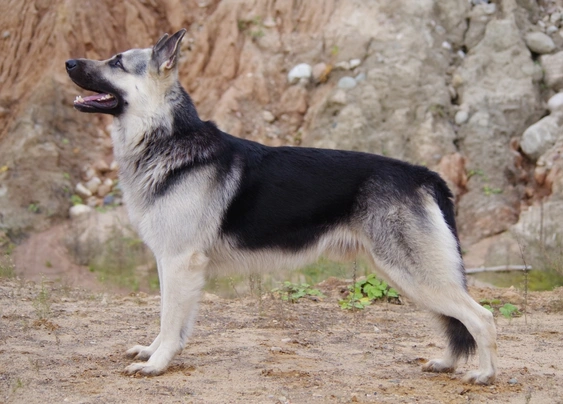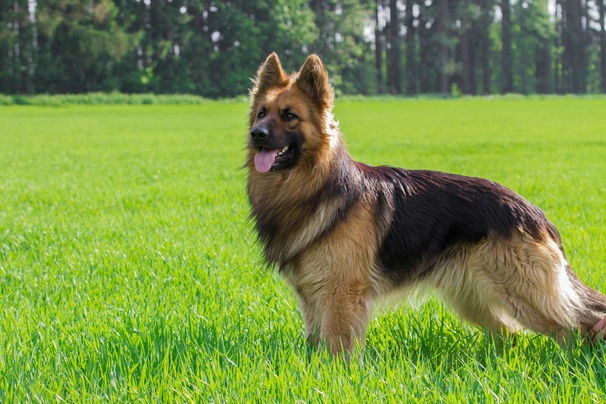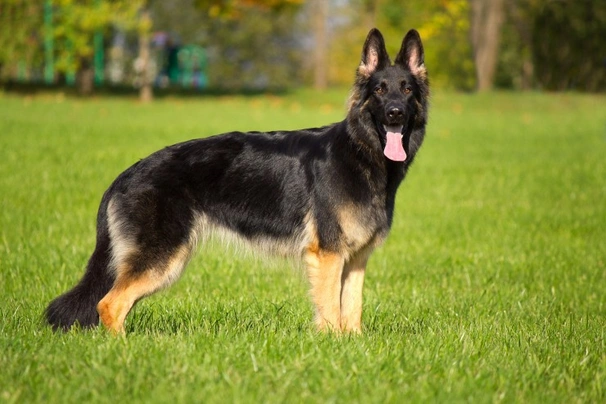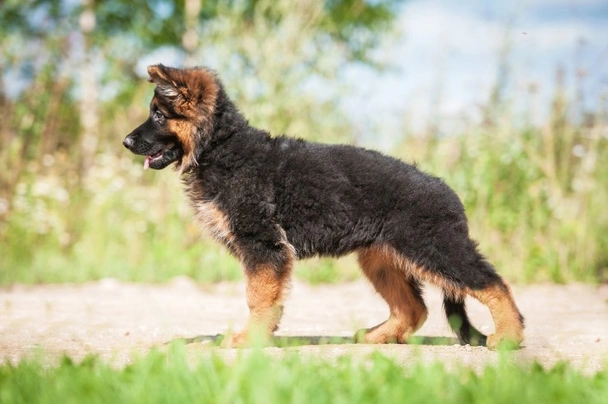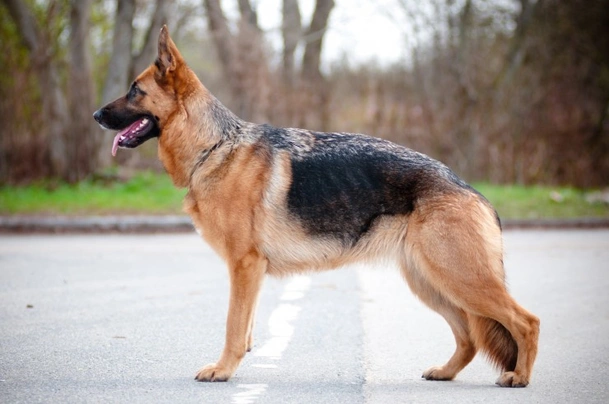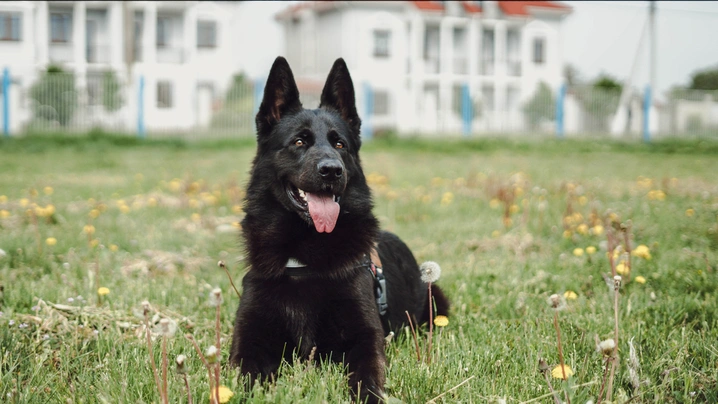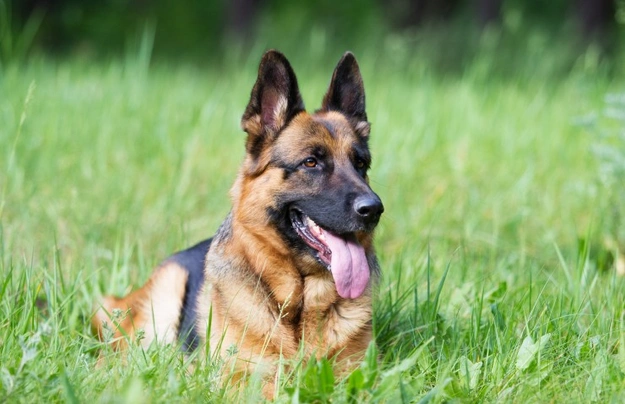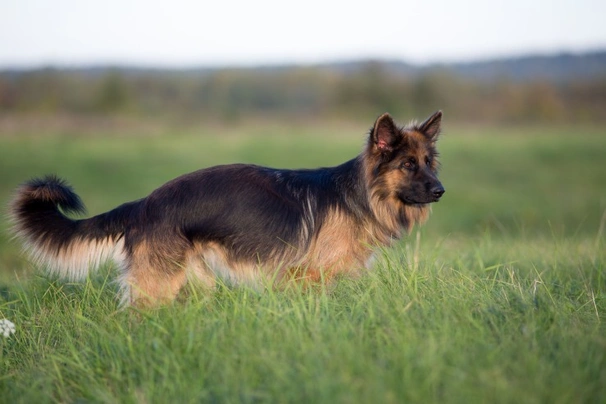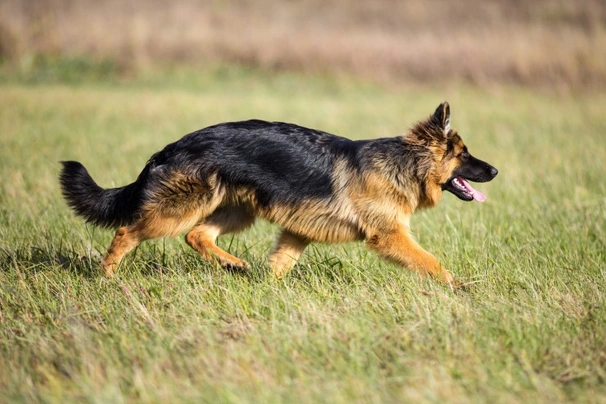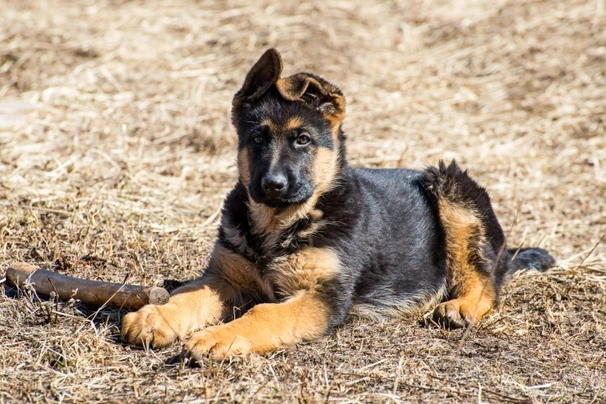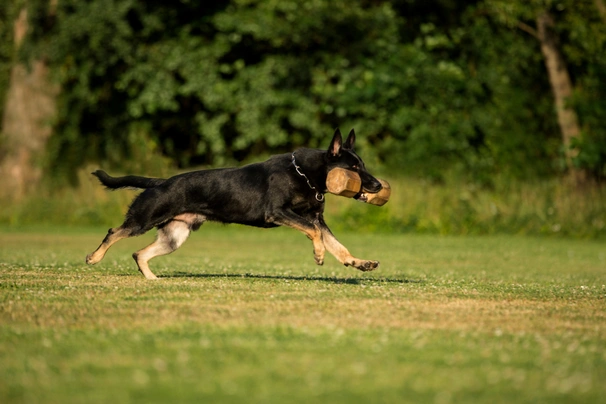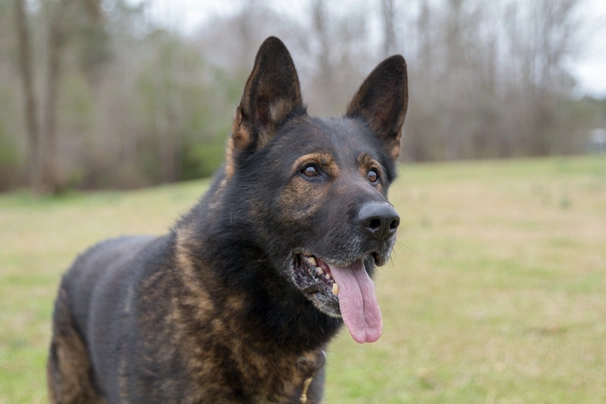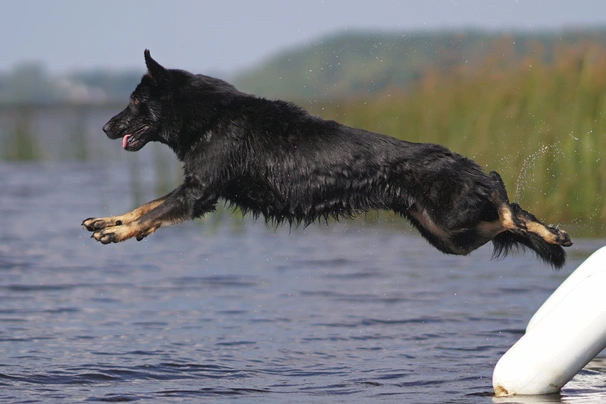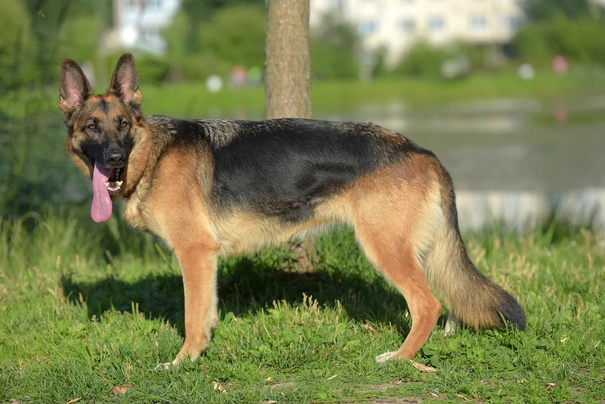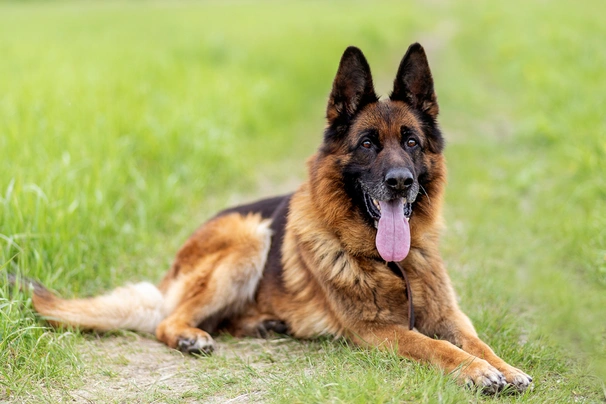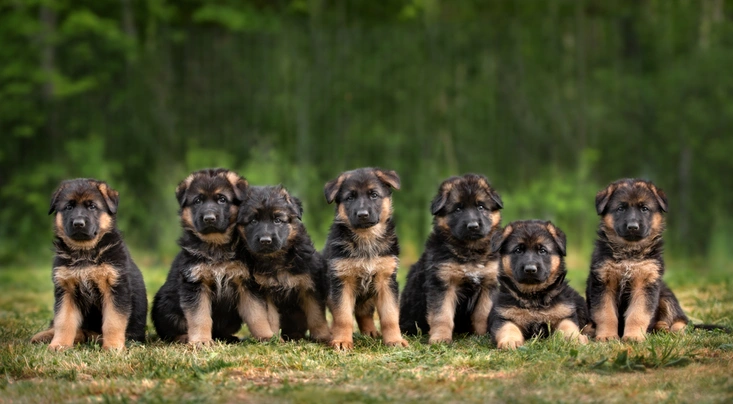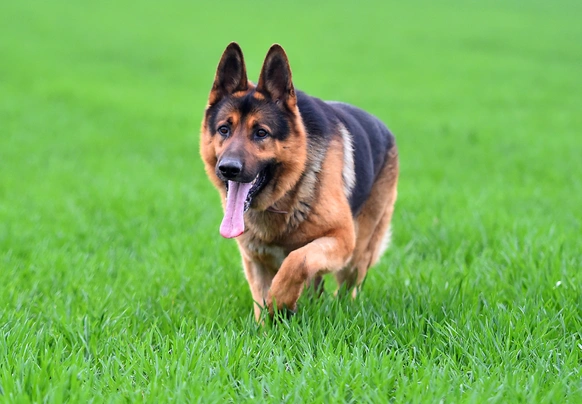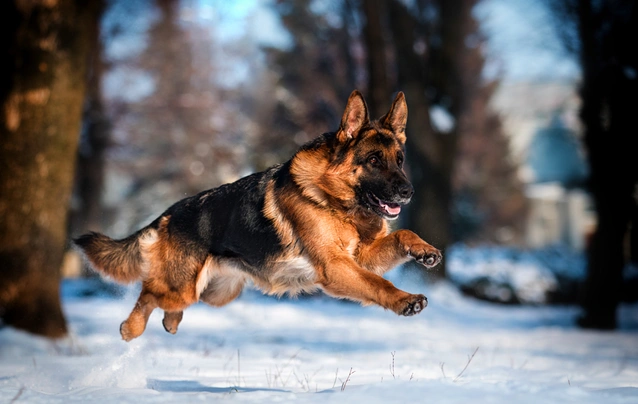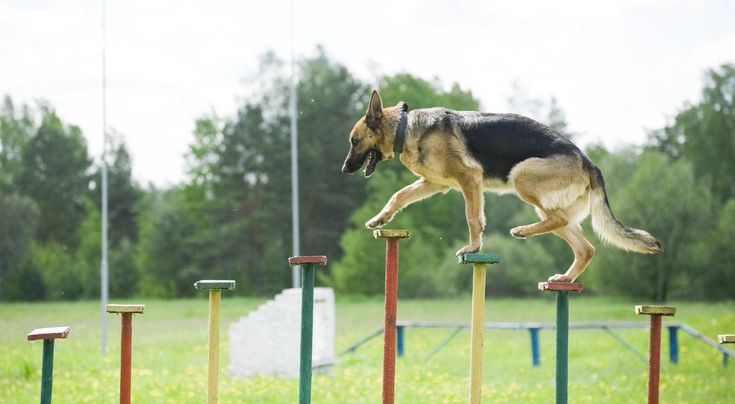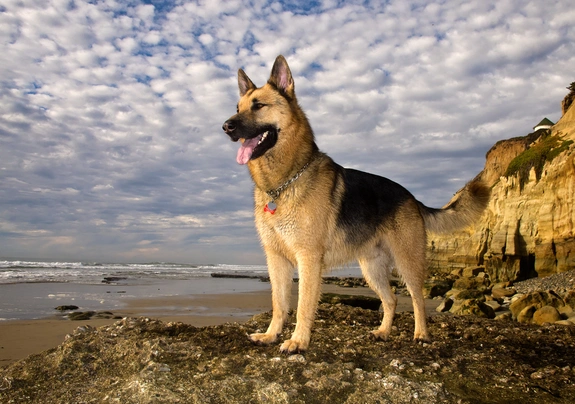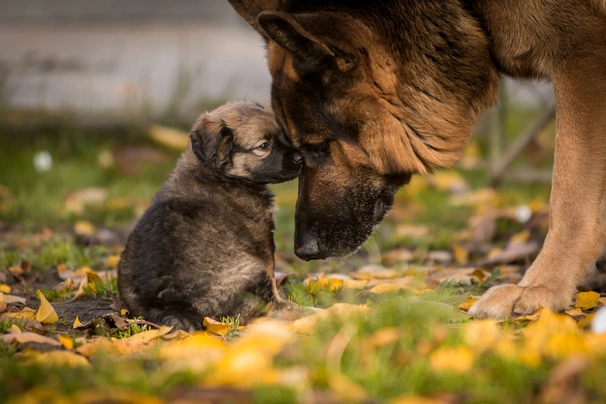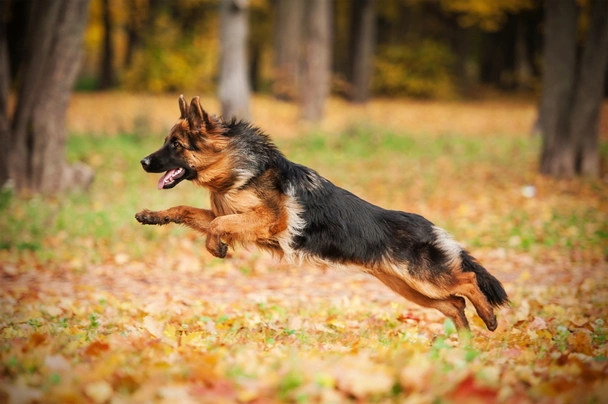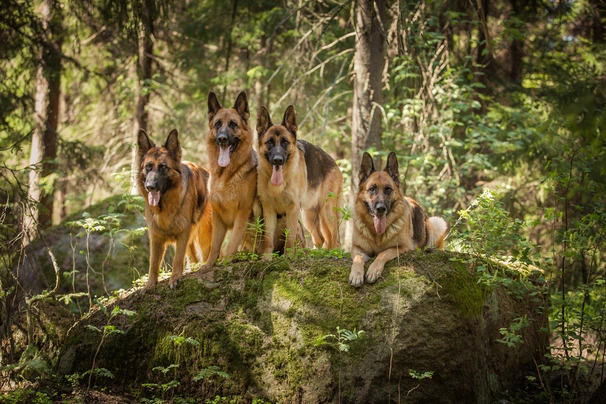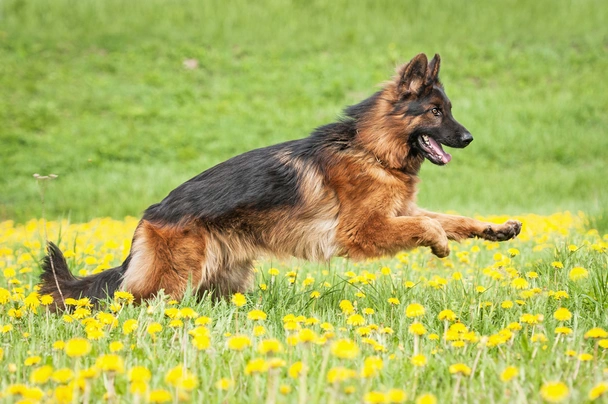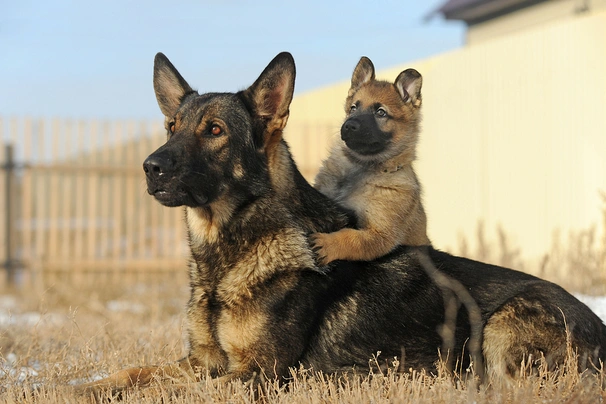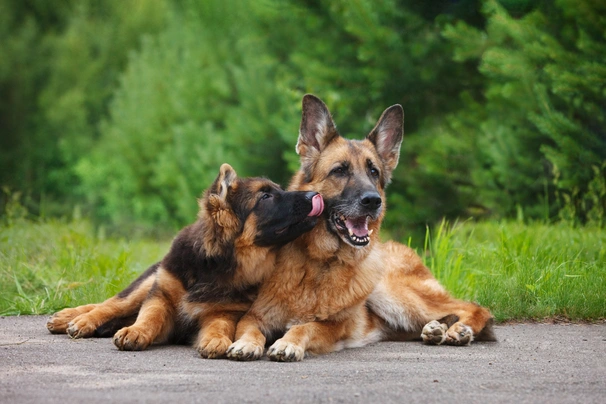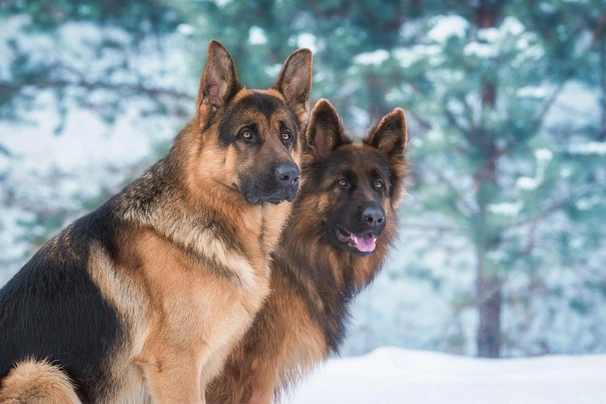German Shepherd
Pros
Cons
Introduction of the German Shepherd
German Shepherds are one of the most popular breeds the world over and have consistently been so for many years. Extremely loyal and intelligent the GSD is not only a great choice as a family pet but they are extremely versatile in a working environment too. Over the years the breed has been used by police forces in many countries they play a vital role in the army thanks to their intelligence alertness resilience stamina reliability and extraordinary scenting skills.
Loyal and courageous the German Shepherd is an elegant and proud dog that soon lets an owner know when strangers are around which is one of the reasons the breed has always been a highly prized watchdog throughout the world. Because they are so intelligent German Shepherds need lots of mental stimulation and physical exercise to be truly happy well-balanced dogs. They also need to be correctly trained and handled with a firm and gentle hand so they know who is alpha dog in a household. GSDs are never happier than when they know their place in the pack and who to look to for direction and guidance becoming valuable members of a family.
History of the German Shepherd
The German Shepherd we see today was first developed in Germany at the end of the eighteenth century by a cavalry captain named Max von Stephanitz. He spent thirty-five years developing and promoting the breed to produce a trustworthy reliable and handsome dog. He encouraged the police force in his native country to use German Shepherds in their line of work and during the First World War thousands of GSDs became part of the German army.
German Shepherds were originally bred as herding dogs and they job was to guard large flocks but the demand for herding dogs decreased over time which is when Max von Stephanitz stepped in to promote the breed's other skills while at the same time honing specific traits namely a dog’s stamina strength speed intelligence eagerness to please and work.
By the late 1800s the first Breed Dog Club was set up in Germany called the Phylax Society (Phylax being Greek for 'Guardsman'). It was established by Max von Stephanitz together with other breed enthusiasts who further developed and promoted the GSD as a working dog and they were subsequently often used by the German army and police force. Their aim was to standardise the breed countrywide. When the first club disbanded Stephanitz set up the Society for the German Shepherd Dog and his own GSD a dog called Hektor was the first GSD to be registered. He then changed his dog's name to Horand von Grafrath and used him in breeding programmes to produce well-bred strong and resilient German Shepherd Dogs namely the ancestors of many German Shepherd lines that we see today.
The breed has evolved over the last fifty years or so with a marked difference in breed "type" appearing on the scene. More recently a longer coated variety of GSD is now part of the recognised Kennel Club Breed Standard.
Interesting facts about the breed
- Are German Shepherds a vulnerable breed? No they are among the most popular dogs in the world and rated the 10th most popular in the UK
- GSDs proved they were reliable and trustworthy dogs during the World Wars when they were used as messengers and guard dogs
- The German Shepherd is one of the very few breeds to have the word “dog” in their name
- The sport of Schutzhund was created in the 1900’s for German Shepherd Dogs
- Max von Stephanitz is known as the “father of the breed”
- German Shepherds were highly regarded for their reliability during the World Wars
- A German Shepherd called Strongheart has a star on the Hollywood Walk of Fame
- German Shepherd Dogs were the first guide dogs
Appearance of the German Shepherd
Average height to withers: Males 60 - 65 cm Females 55 - 60 cm
Average weight: Males 30 - 40 kg Females 22 - 32 kg
The GSD is a mid size to large dog that boasts being a little longer in the body than they are tall. They are powerful muscular dogs with extremely weather-resilient coats. They are very well proportioned dogs with slightly domed foreheads and nicely wedged shaped muzzles.
Their eyes are almond-shaped and medium in size with dark brown being the preferred colour although lighter eye colours are acceptable. The German Shepherd has a lively intelligent expression and gives the impression of being a confident and self-assured character.
German Shepherds have medium to largish size ears that are broader at the base and set high on a dog's head. They carry their ears erect and parallel to each other. These dogs have a strong jaw line with a perfect bite. The boast longish necks that are strong and well-muscled which they carry at an angle at rest but higher when they are on the move or excited.
As previously mentioned the GSD is a well-proportioned dog which sees well-muscled shoulders and legs. They are long in the body compared to their height with a deep chest that's neither too broad nor too thin. Their topline falls away very slightly from the wither down to the croup. Hindquarters are well-muscled strong and broad with powerful back legs. Their feet are well rounded with short dark nails and their pads are extremely well cushioned.
German Shepherds have long tails that they hold in a curve when at rest and a little higher when they move although they never hold their tails higher than the level of their backs.
When it comes to their coat there are two different types in the GSD with the first being short and the second being long but both are extremely weather-resilient. A GSD's outer coat is straight dense and close-lying with dogs having a much thicker and denser undercoat. The hair on a GSD's head ears front legs paws and toes is short but longer and denser on their necks backs of their legs and hindquarters. Dogs with longer coats have feathers on the underside of their tails longer hair on the back of their front legs. The hair is also longer both behind and inside their ears which look like tufts. Some male GSDs may have a slight ruff. It is worth noting that mole-type coats in GSDs are highly undesirable.
Longer coated GSDs have much longer outer coats which don't necessarily have to be straight or close-lying but they do have a very dense and thick undercoat. The hair on the inside and behind a dog's ears is markedly longer so it forms moderately sized tufts. The hair on the back of a dog's front legs is longer and through to their loins too with their hind legs being densely feathered. Tails are bushy having a slight amount of feathering on the underside. Coat colours can be varied and include the following:
- Bi-colour
- Black
- Black & Gold
- Black & Red
- Black & Red Gold
- Black & Silver
- Black & Tan
- Black Gold & Silver
- Black Sable
- Black Tan & Gold
- Black Tan & Sable
- Blue
- Blue & Gold
- Blue & Tan
- Blue Sable
- Dark Sable
- Gold
- Gold Sable
- Grey
- Grey Sable
- Liver
- Red Sable
- Sable
- Silver Sable
- White
Puppies with nearly all black coats typically have black and gold coats as they mature. However it's very hard to predict the amount of black a GSD may have in the coats as adult dogs just by looking at their puppy coats.
One thing worth noting is that although not recognised by KC breed standards the American White Shepherd is continuing to gain popularity as a separate breed.
Gait/movement
The German Shepherd Dog has quite a unique gait and they move positively covering a lot of ground when they do. They move forward placing their feet diagonally with a front leg and opposite back leg moving forward at the same time. They throw a back foot forward to the mid-section of their bodies all the while having a long reach with their front feet which does not alter the shape of their backlines.
Faults
Under the Kennel Club Breed Standard any departures from the standard would be considered as faults with the seriousness of a fault being judged on how much it affects the well-being and health of a dog and their ability to work.
Male GSDs must have two normal testicles fully descended and if they are not this would be deemed a fault.
It is also worth noting that the size given in a GSDs Kennel Club breed standard is to be used as a guide only. As such a German Shepherd Dog may be slightly larger or smaller and weigh a little less or more than stated in their breed standard.
Temperament of the German Shepherd
German Shepherds are renowned for their intelligence alertness and loyalty. However they are not the best choice for first-time owners because they need to be expertly and calmly handled with a firm yet gentle hand. These dogs must know their place in the pack and that their owner is the alpha dog or they could start displaying dominant behaviours which can lead to all sorts of problems which can make a GSD that much harder to handle.
Being essentially a "working" dog German Shepherds need lots of mental stimulation as well as enough daily exercise to be truly happy and well-balanced dogs when they are in a home environment. Because they are so intelligent they are quick to learn new things and this includes picking up "bad habits" all too easily. If left to their own devices and not given the right amount of daily exercise and mental stimulation a German Shepherd Dog may well become a little destructive and noisy around the home and it could be put down to sheer boredom.
GSDs respond extremely well to positive reinforcement training because they are sensitive by nature. They do not react well to any kind of heavy handed handling which could have an adverse effect on a dog's nature. Being alert and loyal German Shepherds can be a little territorial which is something to bear in mind when you know anyone is coming to visit your home and why they have always been so highly prized as watchdogs.
German Shepherds are high maintenance and thrive on being with owners who have the time to devote to a canine companion. They need at least 2 hours exercise every day which must be combined with lots of mental stimulation. Although very versatile a German Shepherd would not do well living in an apartment and ideally they should have a safe large garden to roam around in as often as possible. The GSD prefers to live in a structured family environment and thrives on human companionship which in short means they are better suited to households where one person remains at home when other people are out.
With correct handling the GSD is one of the smartest most trainable of dogs on the planet and when tempered with their calm and unflappable natures they make wonderful family pets and are known for their trustworthiness in a working environment.
Are they a good choice for first time owners?
German Shepherds are not the best choice for first time dog owners because although they are highly intelligent and therefore easy to train they are better suited to people who are familiar with the breed's specific needs and who therefore know how to handle and train them.
What about prey drive?
German Shepherds do have high prey drives but the good news is that with correct training and management a GSD can be taught not to "chase" anything unless it is a ball or object that has been thrown for them. With this said they are known to have other "drives" which includes the following:
- Defence drive - this is very strong in German Shepherds which is why they have always been highly regarded as watch dogs
- Rank drive - a German Shepherd needs to know their place in the "pack" because they have a very high rank drive and if allowed a GSD would quickly take on the role of alpha dog in a household
- Pack drive - GSDs have a high pack drive which is why they hate it so much when they find themselves on their own
What about playfulness?
German Shepherds have a playful side to their natures and enjoy playing interactive games. The excel at many canine sports and thoroughly enjoy taking part in training sessions and competitions. The thing to bear in mind that with dogs like the GSD it's important to differentiate between a dog being playful and when they are asserting their dominance which is something to be avoided at all costs.
What about adaptability?
German Shepherds are better suited to households with largish back gardens. They do not adapt that well to living in an apartment. The reason being that GSDs need the room to express themselves and a good back yard to stretch their legs in whenever they can.
What about separation anxiety?
German Shepherd Dogs thrive on human company and are never happy when left on their own even for shorter periods of time. If a GSD is left alone they suffer separation anxiety which would result in excessive barking and being destructive around the house. When dogs are destructive it is their way of relieving the stress they experience at being alone.
What about excessive barking?
German Shepherds are intelligent and can be taught not to bark unnecessarily. However if a dog is unhappy for whatever reason and this includes because they are left on their own for too long then a GSD could well start barking incessantly because they are stressed out and are trying to get attention. With this said GSDs are good watchdogs and will bark if there are strangers about or if something they don’t like is going on in their environment.
Do German Shepherds like water?
German Shepherd Dogs do like water and enjoy swimming but it's not a good idea to let a dog swim in a pool because of all the chemicals that are used in them. Care should always be taken when a GSD is taken for a walk anywhere near a dangerous water course just in case they decide to leap in.
Are German Shepherds good watchdogs?
German Shepherd Dogs make excellent watchdogs because the need to "protect" is a trait that is deeply embedded in their psyche and why the breed has always been such a highly regarded guard dog throughout the world.
Intelligence / Trainability of the German Shepherd
German Shepherds are highly intelligent and need a tremendous amount of mental stimulation to be truly well-rounded characters. In the right hands and with the correct amount of training they are extremely responsive to commands they are taught. They excel when they take part in obedience classes for this very reason. They are particularly receptive to voice commands when the right sort of intonation is used.
German Shepherds respond well to positive reinforcement and will not accept any harsh methods or handling which includes the way they are corrected when they get something wrong. Well handled they excel at all the canine sporting activities which includes agility Flyball and obedience but they can also be seen working as rescue dogs tracking dogs and helping the police and other authorities in their work all of which are jobs which German Shepherds take in their stride.
It is worth noting that German Shepherds pick new things up very quickly and will respond well to a command even when they have only been given it four or five times. Puppies need to be taught ground rules and commands from the word go and their training must be consistent so dogs understand what an owner expects of them. As previously mentioned an adult GSD should always be handled firmly and fairly to make sure they understand their place in the "pack" and who is the alpha dog in a household. They are never happier than when they know who they can look to for guidance and direction. The key to successfully training a German Shepherd is to always be consistent and to make training sessions short and interesting which helps a GSD stay focused on what is being asked of them.
Children and other
German Shepherds are known to be good around children of all ages because they are so calm and patient more especially if they are well-bred even tempered dogs. With this said GSD puppies can be boisterous during playtime and mature German Shepherds can grow into large dogs. As such care should always be taken when there are toddlers in the home because a GSD may accidentally knock them over during playtime.
GSDs get on well with the family cat and will tolerate being around other family pets they have grown up with. Care should always be taken when a German Shepherd is introduced or meets any other small animals and pets just to be on the safe side.
Health of the German Shepherd
The average life expectancy of a German Shepherd is between 9 - 13 years and sometimes longer when properly cared for and fed an appropriate good quality diet to suit their ages.
With this said the breed is known to suffer from certain hereditary and acquired health issues which includes the following:
- Hip dysplasia - BVA test and scoring available
- Elbow dysplasia - test and scoring available
- Haemophilia - male dogs only
Other health issues that are sometimes seen in the breed include the following:
- Pituitary Dwarfism
- Anal Furunculosis
- Exocrine Pancreatic insufficiency
- Degenerative Myelopathy or CDRM - DNA test available
- Panosteitis
- Bloat/Gastric Torsion
- Epilepsy
- Haemangiosarcoma
- Immune Mediated health issues that affect a dog's skin and/or bowels
- Raisin Toxicity
What about vaccinations?
German Shepherd puppies would have had their first vaccination prior to being sold. After this they need to be vaccinated again following the guidelines below:
10 -12 weeks old bearing in mind that a puppy would not have full protection straight away but would be fully protected 2 weeks after they have had their second vaccination
There has been a lot of discussion about the need for dogs to have boosters. As such it's best to talk to a vet before making a final decision on whether a GSD should continue to have annual vaccinations.
What about spaying and neutering?
When a female GSD is 6 months old they can safely be spayed and male GSD can be neutered when they are 6 months old just providing both testicles are fully descended which they normally have by this age.
What about obesity problems?
German Shepherds can put on weight once they have been spayed and neutered. It is important to keep an eye on a dog's waistline and to adjust their calorie intake if they are putting on weight because it can seriously affect their health. Obesity can shorter a dog's life by several years and puts a lot of pressure on their joints and internal organs. The other thing to bear in mind is that some GSDs when they reach their senior years can also start to plough on the pounds which is usually because they don't go out for the long walks they did when young. It's important to adjust an older GSDs diet to suit their ages and the amount of daily exercise they are given for this very reason.
What about allergies?
German Shepherds are prone to suffering from allergies thanks to the fact they are predisposed to several immune mediated disorders which affect their skin. With this said there are certain triggers that can set off an allergy in a GSD and this includes the following:
- Chemicals commonly found in many household cleaning products
- Dust mites
- Fleas
- Environment
- Pollen
- Diet
Allergies are notoriously hard to treat and finding the exact triggers can be challenging which is why it typically takes a lot of time and effort to resolve a problem when there’s a flare up.
Recognising health issues in German Shepherds
Because German Shepherd Dogs are known to suffer from quite a few health issues it's important to keep a close eye on a pet and if they show any signs of being off colour not interested in their food or going out for a walk it's time to get them down to the vet for a thorough check-up. The sooner a condition is correctly diagnosed and treated the better the outcome tends to be and the quicker a dog is made to feel comfortable.
Participating in health schemes
There are health schemes available for German Shepherds and all reputable breeders would follow the recommendations and advice given by the Kennel Club to ensure good breeding practices. The schemes available for the breed are as follows:
- DNA Profiling and Parentage Verification - a scheme that has been set up by the GSD Breed Council and Animal DNA Diagnostic Ltd that is available to both breeders and owners
- KC/BVA Hip Dysplasia Scheme
- Haemophilia 'A' Testing
- BVA/KC Elbow Dysplasia Scheme
- Eye testing
- DNA test - DM
What about breed specific breeding restrictions?
For the moment there are no breed specific restrictions for German Shepherd Dogs.
What about Assured Breeder Requirements?
It is mandatory for all Assured Breeders to have their stud dogs tested using the following schemes which other breeders should also do:
Other schemes the KC club strongly advises that all breeders follow are as follows:
Caring for the German Shepherd
As with any other breed German Shepherds need to be groomed on a regular basis to make sure their coats and skin are kept in tip-top condition. They also need to be given regular daily exercise so they remain fit and healthy. On top of this German Shepherds need to be fed a good quality diet throughout their lives to ensure all their nutritional needs are met.
Caring for a German Shepherd puppy
German Shepherd puppies are incredibly cute and if they have been well-bred and socialised before rehoming they are generally confident and outgoing. With this said all puppies take a while to settle into a new environment and this includes GSD puppies. It is best to organise their arrival when there are going to be people around for the first week to ensure a puppy is never left on their own during their settling-in time. This is particularly important because the puppy would be without their mothers and litter mates for the first time in their young lives.
It's also crucial for the home and garden to have been "puppy proofed" so the new arrival does not run the risk of getting into trouble or injuring themselves. Setting up a dog crate or bed in a quiet corner of the house that's not too out of the way may take a bit of planning but it's important for a puppy to have an area where they can sleep peacefully bearing in mind that they can sleep for 21 hours a day which they need to do.
German Shepherd puppies are usually easy to house train more especially if they have been used to living in a house with their mother and litter mates. Dogs raised in kennels tend to be a little harder to housetrain because everything is so new to them. The first commands a GSD puppy should be taught include the following:
- Sit
- Stay
- Down
- Drop it
- Heel
- Bed
Things you'll need for your puppy
Having everything needed to care for a puppy before they arrive is important and the essentials to buy include the following:
- Food and water bowls which ideally should be ceramic rather than plastic or metal
- A puppy collar and lead making sure they are good quality items that will last
- A dog crate that's not too small or too big so that a puppy feels lost in it
- A playpen which is a great for puppy to safely stay in when owners cannot keep a close eye on their pets when they are awake and wanting to play
- A good quality dog bed
- Baby blankets which are ideal to put in crates and dog beds for a puppy to sleep on
Keeping the noise down
As previously mentioned puppies need to sleep a lot in between bouts of boisterous play. Having set up a nice quiet corner for their crates or dog beds is great but it's also important to keep the noise down which includes the volume of the television and how loud music is played in the home which could upset and stress a young puppy out.
Keeping vet appointments
A GSD puppy would have been given their first vaccination but it's important for them to have their follow-up ones too. It also a good time for a vet to give a puppy the once over to make sure they are in good health. A puppy's vaccination schedule is as follows:
- 10 -12 weeks old bearing in mind that a puppy would not have full protection straight away but would only be fully protected 2 weeks after they have had their second vaccination
When it comes to boosters it's best to discuss these with a vet because there is a lot of debate about whether a dog really needs them after a certain time. However if a dog needs to go into kennels their vaccinations would need to be fully up to date.
What about German Shepherds when they reach their golden years?
As German Shepherds age like all other dogs they tend to slow down in lots of ways. Not only do their coats and muzzles turn a bit grey but a dog's cognitive function might not be as sharp as it once was either. There are things that owners can do to keep their pet's cognitive function in good shape and this includes not letting them turn into couch potatoes and by making sure they are given enough regular exercise although this would certainly be a lot less than when a dog was young.
Other changes that typically occur when a GSD reaches their golden years includes the following:
- Less eager to go for a walk
- Slower to get up in the mornings
- Quieter during the day
- Older dogs sleep a lot more throughout the day
- They often develop arthritis
- They don't have very good appetites
- Older dogs often drink more water
- Their sight is not as good as it once was
- They might be a little deaf
- Older dogs are often disoriented at times it takes them longer to realise where they are
- They have more trouble controlling their body temperature making them more at risk of feeling the cold and the heat
- Their gait changes and they have trouble jumping up on a sofa or getting into the car
An older dog's diet generally needs rethinking because they need less protein thanks to the fact they don't expend as much energy. A low protein low fat diet is preferable for GSDs when they reach their golden years. Some older German Shepherds should be fed smaller amounts more frequently throughout the day which makes it easier on their digestive systems.
Grooming of the German Shepherd
German Shepherds are heavy shedders due to their thick dense double coats. As such they really benefit from being groomed as often as possible and ideally this should be daily because once a week would not be enough to keep a dog's coat looking good and free of any loose and dead hair.
However GSDs don't need bathing that often because overdoing bathtime could result in altering the natural PH balance of a dog's skin which could lead to skin allergies. One thing to bear in mind is that long haired German Shepherds need a lot more in the way of grooming than shorter haired dogs and they tend to shed a lot more hair too.
Grooming tools needed for German Shepherds
Because German Shepherds are quite high maintenance on the grooming front and the fact they shed a lot throughout the year it's important to have the right tools to keep their coats looking good and a dog's skin in great condition. The grooming tools needed to keep a GSD's coat in great shape includes the following:
- A flea comb
- A double comb
- A dematting comb
- A slicker brush
- A double bristle brush
- An undercoat rake
- Nail clippers
- A pair of round ended scissors
- A tooth brush and dog specific toothpaste
Exercise of the German Shepherd
German Shepherds are high maintenance dogs in the exercise department and ideally need to be taken out for a walk a minimum of twice a day for a good hour each time. However they also need to be given a tremendous amount of mental stimulation or they can quickly start showing signs of boredom and dominance. A GSD in the prime of their life need a minimum of 60+ minutes daily exercise with as much off the lead time as possible but only in areas where it is safe to let a dog run free. It would be okay to take a GSD for a shorter walk first thing in the morning but they would need a much longer walk in the afternoon and preferably one that involves playing interactive games with a dog because walking alone would not be enough to keep a GSD fit healthy and happy.
These dogs thrive on learning new things and as previously mentioned are one of the smartest dogs on the planet which in short means they can also pick up some bad habits if not handled and trained correctly both at an early age and throughout their lives. They are a great choice for people who like to be out and about in the great outdoors as often as they can with a canine companion in tow. German Shepherds are not a good choice of pet for anyone who leads a more sedentary life.
Feeding of the German Shepherd
It is also wise to factor in the cost of feeding a German Shepherd if you are thinking about sharing your home with one of these loyal and large dogs because it works out quite a bit more expensive than other smaller breeds. Being high energy dogs German Shepherds need to be fed a good quality nutritious diet that has a higher protein content to meet their needs and the different stages of their lives.
Adult GSDs are not known to be fussy eaters but it is recommended they not be fed a rich and fatty diet because of the fact they are known to suffer from pancreatic issues. It is also very important to feed a GSD at specific times and a good hour before and after they are given any exercise because of their predisposition to developing bloat (gastric torsion).
It is also very important to avoid giving a German Shepherd any fatty foods when they are in their golden years. Just like any other breed they need to have free access to fresh clean water.
Feeding guide for a German Shepherd puppy
Once a GSD puppy is settled into their new homes which would normally take a few days it is possible to start thinking about changing their diets but this should only be done gradually over the course of 4 weeks. An ideal daily feeding guide for a GSD puppy that suits the first few months of their lives is as follows bearing in mind that puppies should be fed 4 times a day until they are 6 months old and then 3 times a day till they are around 12 months old:
- 2 months old - 265g to 307g depending on a puppy's build
- 3 months old - 327g to 404g depending on a puppy's build
- 4 months old - 354g to 445g depending on a puppy's build
- 6 months old - 405g to 599g depending on a puppy's build
- 8 months old - 404g to 644g depending on a puppy's build
- 10 months old - 370g to 603g depending on a puppy's build
- 12 months old - 334g to 502g depending on a puppy's build
- 14 months old - 331g to 493g depending on a puppy's build
Once a GDS is 16 months old they can be fed adult food.
Feeding guide for an adult German Shepherd
A fully grown mature German Shepherd should be fed a good quality low fat diet and given their food twice a day. But it is important to factor in how many food treats a dog is given every day to prevent them putting on too much weight: As a rough guide a German Shepherd should be fed the following amount of food:
- Dogs weighing 26 kg can be fed 285 g to 435 g a day depending on activity and build
- Dogs weighing 28 kg can be fed 302 g to 460 g a day depending on activity and build
- Dogs weighing 30 kg can be fed 318 g to 485 g a day depending on activity and build
- Dogs weighing 32 kg can be fed 333 g to 509 g a day depending on activity and build
- Dogs weighing 34 kg can be fed 349 g to 532 g a day depending on activity and build
- Dogs weighing 36 kg can be fed 364 g to 556 g a day depending on activity and build
- Dogs weighing 38 kg can be fed 379 g to 579 g a day depending on activity and build
- Dogs weighing 40 kg can be fed 394 g to 601 g a day depending on activity and build
- Dogs weighing 42 kg can be fed 409 g to 674 g a day depending on activity and build
- Dogs weighing 44 kg can be fed 423 g to 646 g a day depending on activity and build
German Shepherd price
If you are looking to buy a German Shepherd Dog be prepared to pay anything from £250 to well over £2000 for a well-bred pedigree puppy bought from a reputable breeder or private seller. The cost of insuring a male 3-year old German Shepherd if you live in the north of England would be just over £22 a month for basic cover up to just over £85 for a lifetime policy (quote as of August 2017). It's worth bearing in mind that lots of things are factored into a dog's insurance premium and this includes where you live in the UK and a dog's age.
When it comes to food costs you would need to buy the best quality dog food whether wet or dry for your dog throughout their lives and to suit the different stages of their lives. This would set you back between £40-£60 a month. On top of these costs you would need to factor in the cost of neutering or spaying a young GSD when the time is right and the price of keeping them vaccinated which when all added up comes to over a £1000 a year.
As a rough guide the average cost of owning a German Shepherd would be in the region of anything between £100 to £150 a month not including the cost of buying a well-bred pedigree German Shepherd puppy in the first place.
Buying advice
When visiting and buying any puppy or dog there are many important things to consider and questions to ask of the breeder/seller. You can read our generic puppy/dog advice here which includes making sure you see the puppy with its mother and to verify that the dog has been wormed and microchipped.
When buying a German Shepherd the size of a dog as stated in the Kennel Club Breed Standard is only a guide and is given as being the ideal for the breed. As such a dog might be slightly smaller or a little larger and may weigh slightly more or less than the given size in their breed standard.
German Shepherds are an extremely popular breed both in the UK and elsewhere in the world which means that well-bred puppies command a lot of money. As such with German Shepherds there is specific advice questions and protocols to follow when buying a puppy which are as follows:
- It is extremely important that all stud dogs be hip scored before being used for breeding purposes and potential owners are advised to ask breeders to provide the results of the tests carried out on parent dogs before buying a puppy. The reason being that GSDs are so prone to suffering from hip and hind leg issues.
- Beware of online scams and how to avoid them. You may see online and other adverts by scammers showing images of beautiful German Shepherd puppies for sale at very low prices. However the sellers ask buyers for money up front before agreeing to deliver a puppy to a new home. Potential buyers should never buy a GSD puppy unseen and should never pay a deposit or any other money online to a seller. You should always visit the pet at the sellers home to confirm they are genuine and make a note of their address.
- As previously touched upon German Shepherds are among the most popular breeds in the UK. As such there are many amateur breeders/people who breed from a GSD far too often so they can make a quick profit without caring for the welfare of the puppies their dam or the breed in general. Under Kennel Club rules a dam can only produce 4 litters and she must be between a certain age to do so. Anyone wishing to buy a GSD puppy should think very carefully about who they purchase their puppy from and should always ask to see the relevant paperwork pertaining to a puppy's lineage their vaccinations and their microchipping

Nala
£200
Titled well bred working line German Shepherds
£2,500
